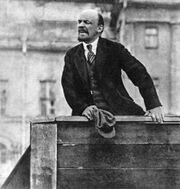Those Quick Little Russians[]

Lenin proclaiming the Union of Soviet Socialist Republics, and declaring himself to be its first Premier
During the First World War, Germany's plan of attack was called the Schlieffen Plan. The plan called for a quick defeat of France, then immediately swing back to the eastern front to defeat the slow-mobilizing Russians, avoiding a two front war. However, due to increased industrializition and better military organization, the Russians mobilize much faster than in OTL. Taking the fight to Germany and Austria-Hungary. The Russians near Berlin by 1916, with France and Britain closing in on the other side, and Austria-Hungary near collapse, the war seemed all but over. However, Lenin and his Bolsheviks, with the help of many disgruntled and unsatisfied soldiers, overthrow the Czar and on December 24, 1916, in what became known as the "Christmas Eve Revolution". Lenin and his socialists declare the Union of Soviet Socialist Republics in an attempt to keep other nations from declaring independence. A civil war breaks out regardless.
With the civil war keeping the new Soviet Union distracted, Germany pushes them back towards the German-Soviet border. Lenin appoints Leon Trotsky as the head of the Soviet Red Army. Trotsky's leadership and Soviet tactics leads them to easily win the civil war and return to fighting Germany. World War I ends in May of 1917.
Paris Peace Conference[]
The victorious Allied powers of Britain, France, and the Soviet Union place the blame for the war on Germany. Forcing them to pay huge reparations and cede large amounts of land. The Soviets, represented by famed war hero Leon Trotsky, Demand that Polish lands, as well as the entirety of Romania be ceded to the USSR. The nations compromise and only ceded land that would have been used to create a new Polish state to the Soviet Union.
Trotsky's Soviet Union[]
Lenin died in 1924, leaving a power vacuum with two competitors hoping to fill it. One was Trotsky, as famous as ever for his role in the civil war, the peace conference, and in suppressing further Czarist revolts in 1920-21. The other is Josef Stalin, a brash military officer. Trotsky easily wins over Stalin and is made Premier. Once in office, Trotsky institutes sweeping reforms to Lenin's Soviet Union. Issuing the Constitution of 1924. The new constitution decentralizes the state run socialist economy, giving power over local projects to community soviets, or councils of workers. The constitution also gives the Soviet Republics more autonomy. It creates a more democratic system of government, the single party system in removed and replaced by a multi-party system. The Congress of Soviets, a national Soviet Parliament, is established. The Congress places 13 men as ministers of a certain arm of government. These men form the Presidium, the Presidium elects the Premier, who is usually the head of whatever party or coalition holds power in the Congress. The Premier serves an indefinite term, staying in office until the Presidium is replaced, the Presidium replaces him, he resigns, or (in the case of Molotov) he dies. Trotsky serves as Premier and head of the Communist Party of the Soviet Union, until 1930, when the People's Labour Party takes power and elects Mikhail Kalinin as Premier. The Communist Party disbands in 1936 and Trotsky retires from politics.
Differences[]
There are many differences between this ALT and the OTL
- The Soviet Union survives to this day and is still a superpower.
- The Soviet Union is more democratic and does not commit human rights abuses, although many, including its own people call it a flawed democracy.
- Soviet-US relations are warmer in the ALT, although they stll see each other as rivals.
- Socialism is more widespread, with most socialist nations in Soviet Orbit.
- The League of Nations still exists, although it is extremely weak and ineffective.
- Due to the shortness of World War II, the US don't invent atomic weapons so early, they are invented by the Soviet Union in 1960, although there is never any real threat of nuclear war as nuclear weaponry doesn't develop far past this point.
